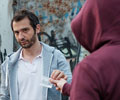
"Our findings strongly suggest that brain malfunction underlies their frequent failure to conform to rules, to make wise decisions, and to avoid relapses back to drug use and antisocial acts," he said.
Researchers at the University of Colorado School of Medicine and the University of Maryland, studied 20 adolescent boys.
On average they had been on probation 139 of the last 180 days; 19 of the 20 had the psychiatric diagnosis of conduct disorder, and all had diagnoses of substance use disorder.
They had been abstinent, however, an average of about five weeks when studied. They were compared with 20 other boys who did not have serious antisocial or drug problems, but who were of similar age, ethnicity, and home neighbourhoods.
All played a computerized risk-taking game that repeatedly presented a choice between a cautious and a risky behaviour: press the left button and always win one cent, or press the right button and either win five cents or lose ten cents.
Advertisement
Brain activation differed dramatically in the two groups.
Advertisement
Altogether, during decision-making about 6000 voxels (a voxel is a tiny cube in the brain) activated significantly less in antisocial boys than in comparison boys. No voxels activated more in antisocial boys. Such under-activity during decision-making could contribute to disinhibited antisocial and drug-using behaviours.
The antisocial boys also had dysphoria, a chronic sad-anxious state, with "reward insensitivity"; in the game their brains responded less than the comparison boys' brains to wins.
They also had "punishment hypersensitivity", with greater brain response to losses than comparison boys.
Source-ANI













